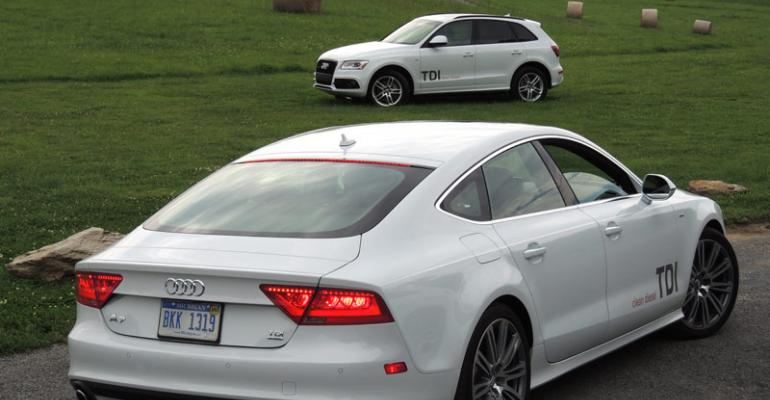WASHINGTON – Two competing auto makers this week are demonstrating their commitment to turbodiesels as the smart powertrain choice in the U.S. premium-vehicle segment.
In Portland, OR, Mercedes-Benz is offering journalists a first drive of the new ’14 E250 Bluetec sedan, powered by a 195-hp 2.1L 4-cyl. that is stout enough to replace the previously available 3.0L turbodiesel V-6 and motivate the flagship S-Class sedan in Europe.
Meanwhile, in the nation’s capital, Audi stages a TDI Efficiency Rally, encouraging auto writers to experience its new 3.0L turbodiesel V-6 in the auto maker’s A6 and A7 sedans and Q5 cross/utility vehicle. The same engine appears in the A8 sedan and Q7 CUV.
Ten 2-person teams drive the three vehicles for 300 miles (483 km) through Maryland and Virginia and score an overall average of between 27.7 mpg (8.5 L/100 km) and 35.4 mpg (6.6 L/100 km).
Diesels represent less than 3% of light-vehicle sales in the U.S., but industry experts forecast their market share to climb to 8% or even 10% by 2018. Through July, deliveries of diesel-equipped vehicles were up 24%.
Growth is expected as auto makers develop technologies allowing them to meet the 35.5-mpg corporate average fuel economy mandate by 2016. In general, diesels offer up to 30% efficiency gains relative to comparably sized gasoline engines.
Some 20 models were available with diesel engines at the start of 2013, but that number is expected to double by year’s end, says Andreas Sambel, director-diesel marketing for Robert Bosch, a leading supplier of common-rail systems.
German auto makers have a big head start with diesel engines, as they are extremely popular in Europe.
In addition to the new Audi and Mercedes engines, BMW has a new 4-cyl. turbodiesel in the 328d headed to the U.S., and Volkswagen will bring a new 4-cyl. diesel in the redesigned Golf in 2014. That same VW powerplant also will appear in the next-generation Audi A3, although arrival timing remains unclear.
A number of these new diesels will be included this fall as editors evaluate nominees in the 2014 Ward’s 10 Best Engines competition. Also in the hunt, depending on availability, will be new diesels in the Chevrolet Cruze, Mazda6, Jeep Grand Cherokee and Ford Transit Connect.
At the Audi event here, the University of Michigan Transportation Research Institute unveils its latest study on the total cost of ownership of diesel engines, which have been criticized in the past for being too expensive.
Total cost of ownership in the U.S. includes vehicle depreciation, fuel, insurance, license/fees, maintenance and repairs. The study was sponsored by Bosch.
Based on a driving cycle of three years or 45,000 miles (72,419 km), the report finds diesels less expensive overall than their gasoline counterparts in vehicles such as the Chevrolet Silverado, Volkswagen Jetta and Mercedes M-Class.
The total cost of ownership for the Mercedes GL-Class SUV over three years is a whopping $13,514 less for the diesel. Across the board, depreciation represents the largest savings for diesel owners, the study finds. In the VW Golf, the 3-year savings is more than $5,000.
Another significant reduction in cost over three years is fuel. Although diesel can cost $0.30 or $0.40 more at the pump than regular gasoline, the improved efficiency allows drivers to fill up less frequently.
Extending the research to a driving cycle of five years or 75,000 miles (120,698 km), the cost benefits continue to be sizable for some models. The Mercedes GL delivers $15,619 in savings and the Jetta $5,475.
However, the 5-year savings in the diesel Golf falls to only $1,506 because depreciation achieves near-parity with the gasoline version, according to the study. Fuel costs remain significantly lower in the Golf diesel, but the cost of repairs for the oil-burner becomes higher over the timeframe.
Also in the 5-year evaluation, the diesel-powered Silverado and GMC Sierra heavy-duty pickups remain less expensive to own than their gasoline counterparts. However, Chrysler’s Ram and Ford’s F-250 heavy-duty pickups actually become slightly more expensive to own than their gasoline equivalents (about $800 in both cases).
LMC Automotive forecasts U.S. sales of diesel vehicles will grow from 400,000 units in 2011 to almost 1 million in 2016. Much of that growth will come in the SUV, luxury- and compact-car segments.
Although diesel vehicles tend to be more expensive to purchase, LMC finds they also carry higher residual values than gasoline equivalents.
Mercedes is attempting to address the issue of purchase price with the new E250 diesel. In the previous E-Class, the V-6 diesel carried a $1,500 premium over the gasoline V-6. The refreshed ’14 E-Class with a 4-cyl. diesel now becomes the new entry-level sedan and costs $500 less than the gasoline V-6.
A vital question in the ramp-up of diesel vehicles in the U.S. is the availability of diesel fuel. Demand for the fuel will rise, but supply may be hampered because the U.S. does not have many refineries for diesel fuel.





